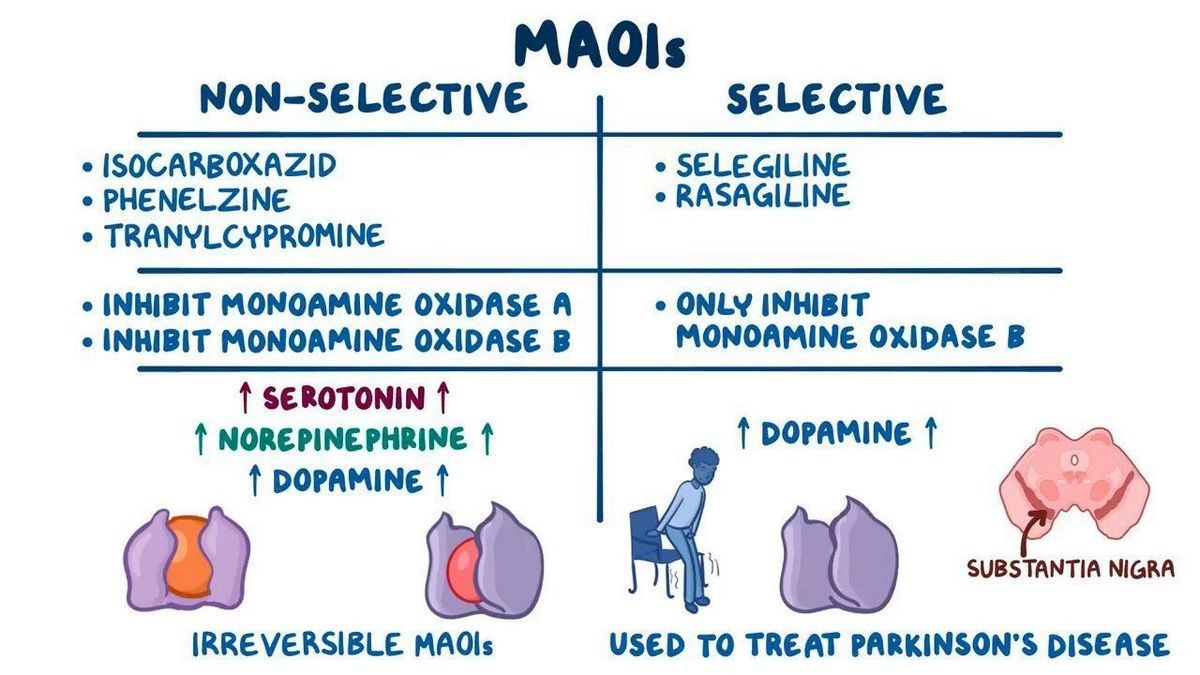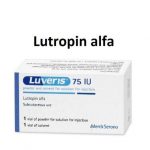
Contents
- 1 Monoamine Oxidase Inhibitors (MAOIs) vs. Selective Serotonin Reuptake Inhibitors (SSRIs)
Monoamine Oxidase Inhibitors (MAOIs) vs. Selective Serotonin Reuptake Inhibitors (SSRIs)
Monoamine oxidase inhibitors (MAOIs) were the first class of antidepressants developed. They fell out of favor due to concerns about interactions with foods and other drugs. MAOIs elevate levels of norepinephrine, serotonin, and dopamine in the brain by inhibiting monoamine oxidase. This enzyme breaks down these neurotransmitters. Inhibiting monoamine oxidase prevents the breakdown of norepinephrine, serotonin, and dopamine, increasing their concentration in the brain. MAOIs are also used for Parkinson’s disease.
Selective serotonin reuptake inhibitors (SSRIs) are a type of antidepressant used for depression and some anxiety disorders. They work by increasing serotonin levels in the brain. Unlike MAOIs and tricyclic antidepressants (TCAs), SSRIs have minimal impact on norepinephrine levels. They also have fewer side effects, less drug interactions, and a lower suicide risk compared to TCAs.
QUESTION
What are the side effects of MAOIs and SSRIs?
MAOIs
MAOIs have several side effects due to their impact on neurotransmitters. Side effects include:
- Sudden drop in blood pressure upon standing (orthostatic hypotension)
- Lack of strength
- Weakness
- Nausea
- Vomiting
- Dizziness
- Drowsiness
- Headache
- Fatigue
- Agitation
- Abnormal voluntary movement
- Dry mouth
- Abdominal pain
- Anxiety
- Change in mood or behavior
- Weight gain
- Impotence (erectile dysfunction, ED)
MAOIs also carry boxed warnings for suicidal thinking and behavior in children, adolescents, and young adults.
SSRIs
- Headaches, nausea, vomiting, and diarrhea are common side effects of SSRIs.
- Insomnia, restlessness, and agitation also occur but usually decrease over time. Insomnia can be treated with low-dose trazodone at bedtime, and agitation can be managed by reducing the SSRI dose or using anti-anxiety drugs.
- Sexual dysfunction is associated with SSRIs. Treatments for sexual dysfunction in men include sildenafil (Viagra), yohimbine, amantadine, cyproheptadine, or neostigmine.
- Weight loss or gain has been reported with SSRIs. Initial weight loss may be followed by weight regain.
What is the dosage of MAOIs vs. SSRIs?
MAOIs
MAOIs are available in oral tablet form. A common MAOI is rasagiline. The recommended dose is 1 mg once daily for monotherapy or 0.5 mg once daily when combined with levodopa. The dose may be increased to 1 mg if needed. Patients with mild liver disease should not exceed 0.5 mg daily, while moderate or severe liver disease patients should avoid it. Tyramine-rich foods should be avoided when taking rasagiline.
SSRIs
SSRIs are usually taken as tablets or capsules. For example, fluoxetine is commonly used at a daily dose of 20-80 mg for depression in adults. The recommended dose for depression in children is 10-20 mg daily. After 13 weeks, some patients may respond well to a once-weekly dose of 90 mg.
What drugs interact with MAOIs and SSRIs?
MAOIs
MAO inhibitors should not be combined with antidepressants, pain medications, dextromethorphan, St. John’s Wort, cyclobenzaprine, mirtazapine, seizure medications, pseudoephedrine, phenylephrine, ephedrine, phenylpropanolamine, or tyramine-rich foods. These combinations can lead to high serotonin levels, causing confusion, high blood pressure, tremors, hyperactivity, coma, or even death. MAOIs should not be used within 14 days of stopping another MAOI.
MAOIs can also interact with seizure medications, increasing side effects. They are not recommended with pseudoephedrine and certain other drugs, as it can cause acute hypertensive episodes.
SSRIs
- Combining SSRIs with other drugs that increase serotonin levels can cause confusion, high blood pressure, tremors, hyperactivity, coma, and death. Examples of such drugs include MAOIs, TCAs, sumatriptan, linezolid, St. John’s Wort, tramadol, and meperidine.
- SSRIs may increase the risk of gastrointestinal bleeding when combined with nonsteroidal anti-inflammatory drugs (NSAIDs).
- SSRIs can also affect the effectiveness of the blood thinner warfarin, increasing the risk of bleeding. Patients taking warfarin and NSAIDs should be closely monitored when also taking SSRIs.
Subscribe to MedicineNet’s Depression Newsletter
By clicking "Submit," I agree to the MedicineNet Terms and Conditions and Privacy Policy. I also agree to receive emails from MedicineNet, and I understand that I may opt-out of MedicineNet subscriptions at any time.
Are MAOIs and SSRIs safe during pregnancy or breastfeeding?
MAOIs
- The FDA classifies MAO inhibitors in pregnancy category C, indicating a lack of established evidence for their safe use in pregnant women. Risk to infants cannot be ruled out.
- It is unknown if MAO inhibitors enter breast milk, but they should be avoided by nursing mothers to prevent harm to the baby.
SSRIs
- The safety of SSRIs during pregnancy and breastfeeding has not been established. Therefore, they should not be used during pregnancy unless the expected benefits outweigh the potential risks to the fetus.
- Many SSRIs are excreted in human milk and should not be given to nursing mothers unless the expected benefits outweigh the possible risks to the child.
From
Depression Resources
- Depression Patient Blogs
- Advances in Depression Treatment
Featured Centers
- Best PsA Treatments for You?
- Understanding Biologics
- 10 Things People With Depression Wish You Knew
Summary
Monoamine oxidase inhibitors (MAOIs) and selective serotonin reuptake inhibitors (SSRIs) are types of antidepressants used to treat depression. MAOIs are an older class of antidepressants that have fallen out of favor due to interactions with drugs and foods. They are also used for Parkinson’s disease. SSRIs are also used for anxiety treatment.


